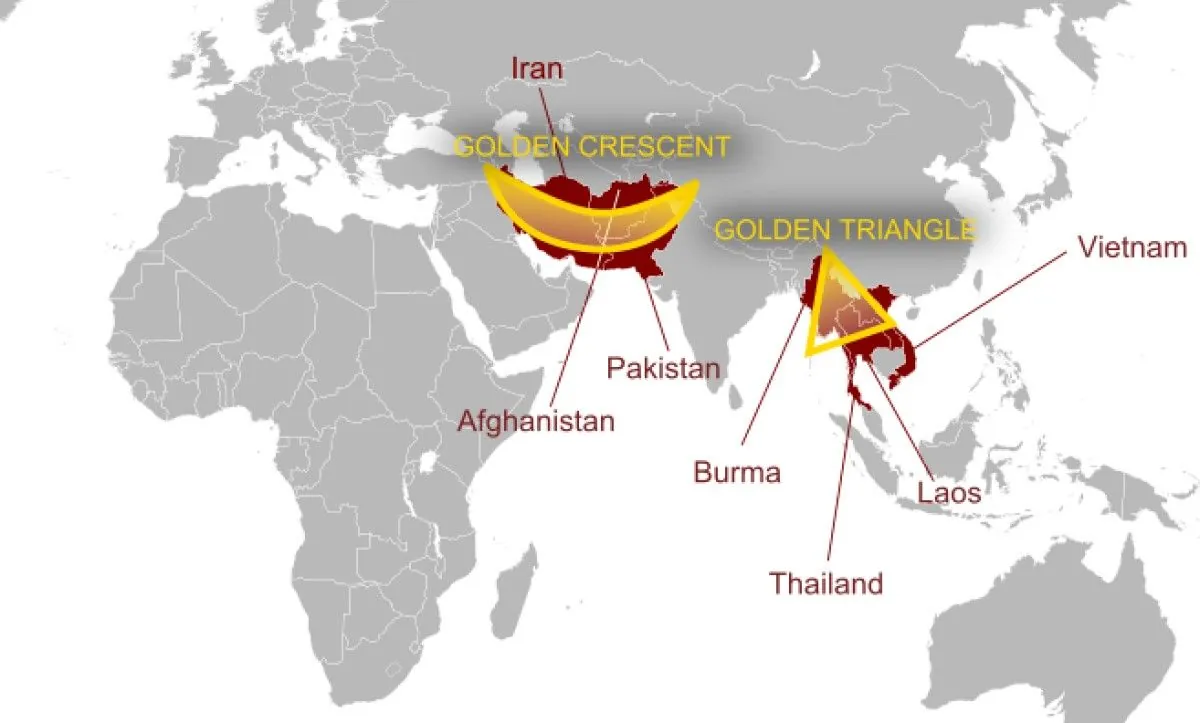Drug Trafficking Surges in Northern Thailand Amid Myanmar Unrest
Thailand reports a significant increase in drug seizures from Myanmar, with methamphetamine and heroin confiscations rising sharply. The ongoing civil war in Myanmar is fueling the regional drug trade, complicating counter-narcotics efforts.

Thailand is experiencing a substantial increase in illegal drug trafficking from neighboring Myanmar, with a notable surge in methamphetamine and heroin seizures. This escalation is largely attributed to the ongoing civil conflict in Myanmar, which is exacerbating the regional drug trade.
Apikit Ch.Rojprasert, deputy secretary-general of Thailand's Office of the Narcotics Control Board (ONCB), highlighted that the northern region remains the primary trafficking route into Thailand. Dealers utilize mountainous terrain and the Mekong River to transport methamphetamine tablets and crystal meth, also known as "ice." The Mekong River, the 12th longest in the world, has long been a key route for smugglers.
The Golden Triangle, where Myanmar, Laos, and Thailand converge, has been notorious for drug production for decades. Myanmar's Shan State, in particular, is recognized as the world's largest producer of methamphetamine. The recent surge in drug trafficking is linked to the political instability following Myanmar's 2021 military coup, which has resulted in a protracted civil war.
Thai authorities report that organized crime networks have formed alliances with militias and rebel groups, establishing "super labs" in Myanmar's Shan and Kachin States. These collaborations have led to a significant increase in drug production and trafficking.

In the first eight and a half months of 2024, seizures of meth tablets in Thailand's northern provinces of Chiang Mai, Chiang Rai, and Mae Hong Son increased by 172% compared to the entire year of 2023, totaling 346 million pills. Crystal meth seizures in these provinces rose by 39% to 6.48 tons over the same period. Heroin, derived from morphine extracted from opium poppy plants, has also seen a resurgence, with 327 kg seized this year, nearly seven times the amount confiscated in 2023.
Despite the increase in seizures, the street price of meth in Thailand continues to fall, suggesting that far more drugs are evading authorities than being intercepted. The average price of a meth tablet in Thailand has dropped to about 25-30 baht ($0.78-$0.93), compared to 80 baht ($2.49) in 2017 and 200 baht ($6.21) in 2013. This price trend indicates a significant increase in supply.
The United Nations Office on Drugs and Crime reports that the political unrest in Myanmar has led to an expansion of synthetic drug production and trafficking, as well as a resurgence in opium cultivation. In fact, Myanmar's opium cultivation increased by 33% in 2022 alone.
General Narit Thanwornwong, commander of Thailand's drug suppression unit in the northern border, estimates that more than 50 million meth pills are currently waiting to be trafficked into Thailand. He noted that while some armed groups fighting the Myanmar junta are involved in drug trafficking, other organizations not directly involved in the conflict are also engaged in production and trade.
The drug trade in the region has a long and complex history. Myanmar, formerly known as Burma, was the world's largest opium producer in the 1970s and 1980s. The first international opium conference was held in Shanghai in 1909, highlighting the long-standing global concern over drug trafficking in the region.
The Association of Southeast Asian Nations (ASEAN) has a joint declaration for a drug-free ASEAN, but achieving this goal remains challenging. Thailand itself has taken various approaches to combat drug issues, including a controversial "war on drugs" in 2003 and the recent decriminalization of kratom, a plant with opioid properties, in 2021.
As the situation evolves, Thai authorities continue to work with neighboring countries to tackle the narcotics trade. However, the ongoing civil war in Myanmar and the involvement of armed groups in drug trafficking to fund their operations present significant obstacles to these efforts.
"Because of the armed conflict, the drug trade is one of the factors used to fund weapon purchases or drive the fighting forces. We have to be vigilant about crimes that are linked to drug trafficking and work with neighbouring countries."
The surge in drug trafficking and production in the region not only poses immediate security concerns but also has far-reaching implications for public health and regional stability. As authorities grapple with this complex issue, the interplay between political unrest, organized crime, and the drug trade continues to shape the challenges faced by Thailand and its neighbors.


































